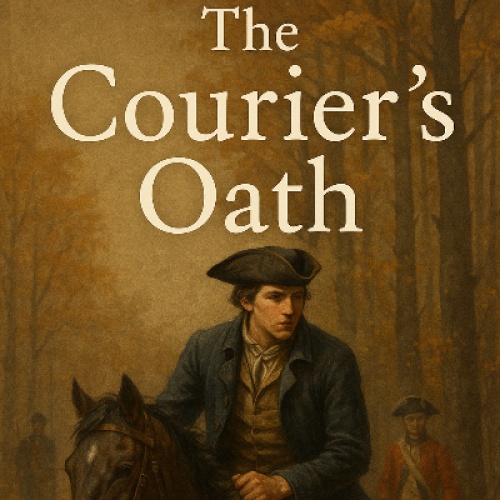Seventeen-year-old Thomas Hale rode through the backwoods, his breath clouding the air. He was not a soldier, but he carried something far more dangerous than a musket - dispatches from Washington's camp meant for General Horatio Gates in the north. If caught, he would be hanged as a spy.
Thomas had been raised in a Loyalist family, his father a merchant who believed British rule brought order. But Thomas had seen the redcoats burn farms and jail men for speaking out. When he learned to read the words of Paine and Jefferson, his heart turned to the cause of liberty. So he made a vow: he would serve the colonies, even if he did it in secret.
Now, with the documents hidden in his boot, he navigated deer trails and frozen streams. The British had patrols on all main roads. One mistake, and his journey would end with a noose.
On the third night, he reached a small hamlet near Albany. The town seemed asleep, smoke curling from chimneys, the scent of boiled turnips in the air. He approached the only inn with candlelight still glowing.
Inside sat a man with a powdered wig and sharp eyes - a British officer. Thomas's heart pounded. He gave a quiet nod and moved to the fire. The officer eyed him.
"You're far from home, lad," he said.
Thomas forced a smile. "Courier for a merchant. From Boston."
"Boston? Bold to travel these woods alone."
Thomas sipped the warm cider the innkeeper gave him. "Trade doesn't stop for war."
That night, he slept with one eye open, his hand on the knife beneath his blanket. At dawn, he slipped out, boots crunching frost. By midday, he reached a Patriot outpost.
A sentry challenged him. "Who goes?"
"Friend of the cause," Thomas said. "I carry word from the General."
Inside the cabin, the commanding officer - a lean man with tired eyes - opened the sealed letter. After a moment, he smiled.
"This changes everything," he said. "Washington needs Gates to move. We ride tonight."
Thomas sat down, exhausted, as the men prepared for war. He had no medals, no uniform - but he had helped shape the next movement of the army. For a moment, he felt proud.
Weeks later, the news came: General Gates had won a stunning victory at Saratoga, forcing British General Burgoyne to surrender. The French, impressed, joined the American cause.
In the shadows of history, Thomas's name would not appear. But he had made a difference.
And he kept riding.






